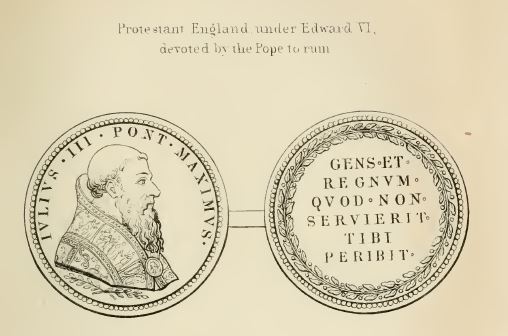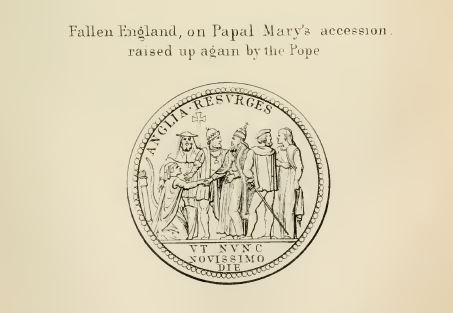|
The
fall of the tenth part of the city. “And the tenth part of the city
fell.”—To understand the intent of this prediction, nothing more seems
necessary than to remember that the Apocalyptic great city included in
its empire, according to the prophecy, just
ten kingdoms; and that the
word fall is used in prophecy
with reference to cities or countries conquered, and transferred to the
dominion of a triumphant enemy. It was the conquest and overthrow of the
Papal Empire in one of these ten kingdoms, apparently, that was the
thing predicted. As to the hostile power by which it was to be
overthrown, I think the context indicates that this would not be (so as
in the previous judgments on “the third part of men,” noticed in Apoc. 8
and 9) either heathen or
Mahometan invaders: but
rather the aggression of
Protestantism, that most terrible of all enemies to Papal imposture;
this being that from which the
earthquake, or great political schism that has been spoken of, had
its origin. So that we have only to turn to history for the solution of
the question: and to ask; Was there any one of the ten kingdoms of Papal
Christendom,—and, if so, which,—wherein, about the same time as the
great political exaltation of the Protestants in Northern Germany, the
Papal Empire fell, overthrown by Protestantism?
And, in answer to the question, does not
history, as with a finger-point, direct the inquirer to
England? to England, one of
the most notable of the ten Papal kingdoms?—The story of the great
revolution that now befell it is soon told. By the teaching of certain
Lutherans that visited its shores soon after Luther’s return from his
Patmos, in fulfilment of the commission given to him and them,—“Thou
must prophesy before many kings, nations, and languages,”—by the
teaching, I
 say, of these, and of such few survivors too as might remain
of the Wicliffites or
Lollards, the minds of not a
few of the English had been secretly preparing for the change. But in
this case their agency was at
first less conspicuous and effective. Ostensibly the political movement
had here precedence of the spiritual. God is a wonderful worker; and
overrules alike the most opposite principles and characters, to effect
his own purposes. The imperious and licentious Henry VIII was, at the
time of Luther and the Reformation, king of England. In the year 1521 he
had actually come forward to dispute with Luther, as the champion of the
Papacy. Ere ten years had past, other motives swayed him. Dissatisfied
with his marriage with Queen Catherine, and doubtful of its lawfulness,
he sued the Pope for a Divorce. Unsuccessful, and revolted by the
chicanery of Rome, he summoned his Parliament. Then the memorable act
was passed by which Papal
supremacy was renounced in England, and the king declared head
(temporal head) of the church. So did
Papal England fall in the
earthquake; i. e. the Papal dominion in England.—In point of
time the event synchronized
with the earlier steps of the German Protestants towards ascendancy: the
first threatening of
separation between Henry and the Pope being in 1529, just when the
German reformers united under the name of
Protestants; and the
Act of Parliament past in
1534, say, of these, and of such few survivors too as might remain
of the Wicliffites or
Lollards, the minds of not a
few of the English had been secretly preparing for the change. But in
this case their agency was at
first less conspicuous and effective. Ostensibly the political movement
had here precedence of the spiritual. God is a wonderful worker; and
overrules alike the most opposite principles and characters, to effect
his own purposes. The imperious and licentious Henry VIII was, at the
time of Luther and the Reformation, king of England. In the year 1521 he
had actually come forward to dispute with Luther, as the champion of the
Papacy. Ere ten years had past, other motives swayed him. Dissatisfied
with his marriage with Queen Catherine, and doubtful of its lawfulness,
he sued the Pope for a Divorce. Unsuccessful, and revolted by the
chicanery of Rome, he summoned his Parliament. Then the memorable act
was passed by which Papal
supremacy was renounced in England, and the king declared head
(temporal head) of the church. So did
Papal England fall in the
earthquake; i. e. the Papal dominion in England.—In point of
time the event synchronized
with the earlier steps of the German Protestants towards ascendancy: the
first threatening of
separation between Henry and the Pope being in 1529, just when the
German reformers united under the name of
Protestants; and the
Act of Parliament past in
1534,
 the year of the Treaty of
Kadan; a year noted, we saw, as the second great epoch of the rise
of the Protestant power in Germany.—As yet, however, Protestantism was
not established in England. Through the remainder of the reign of Henry
Popery indeed lay in ruins; but no edifice of real evangelical
Protestantism was erected in its stead. But in Edward the VIth’s reign,
which quickly followed, and which lasted till a little while after the
Treaty of Passau, viz. from 1546 to 1553, this blessed consummation was
effected. The English Protestant evangelic Church, thanks be to God, was
fully organized and established on the ruins of the Papal. The bloody
Mary, on succeeding, for a few years threatened its subversion, and the
restoration of Popery. But a speedy death terminated her projects. The
sufferings and constancy of the Marian martyrs served effectually to
endear the Reformation to the hearts of the people; and indeed this was
needed for that great purpose.3 The reign of Elizabeth
followed. The half-re-constructed
tenth of the Papal City fell again. And the
Protestant or
witness Church of England was
then fully fixed in the heaven of political exaltation; where it has
ever since remained. the year of the Treaty of
Kadan; a year noted, we saw, as the second great epoch of the rise
of the Protestant power in Germany.—As yet, however, Protestantism was
not established in England. Through the remainder of the reign of Henry
Popery indeed lay in ruins; but no edifice of real evangelical
Protestantism was erected in its stead. But in Edward the VIth’s reign,
which quickly followed, and which lasted till a little while after the
Treaty of Passau, viz. from 1546 to 1553, this blessed consummation was
effected. The English Protestant evangelic Church, thanks be to God, was
fully organized and established on the ruins of the Papal. The bloody
Mary, on succeeding, for a few years threatened its subversion, and the
restoration of Popery. But a speedy death terminated her projects. The
sufferings and constancy of the Marian martyrs served effectually to
endear the Reformation to the hearts of the people; and indeed this was
needed for that great purpose.3 The reign of Elizabeth
followed. The half-re-constructed
tenth of the Papal City fell again. And the
Protestant or
witness Church of England was
then fully fixed in the heaven of political exaltation; where it has
ever since remained.
|

